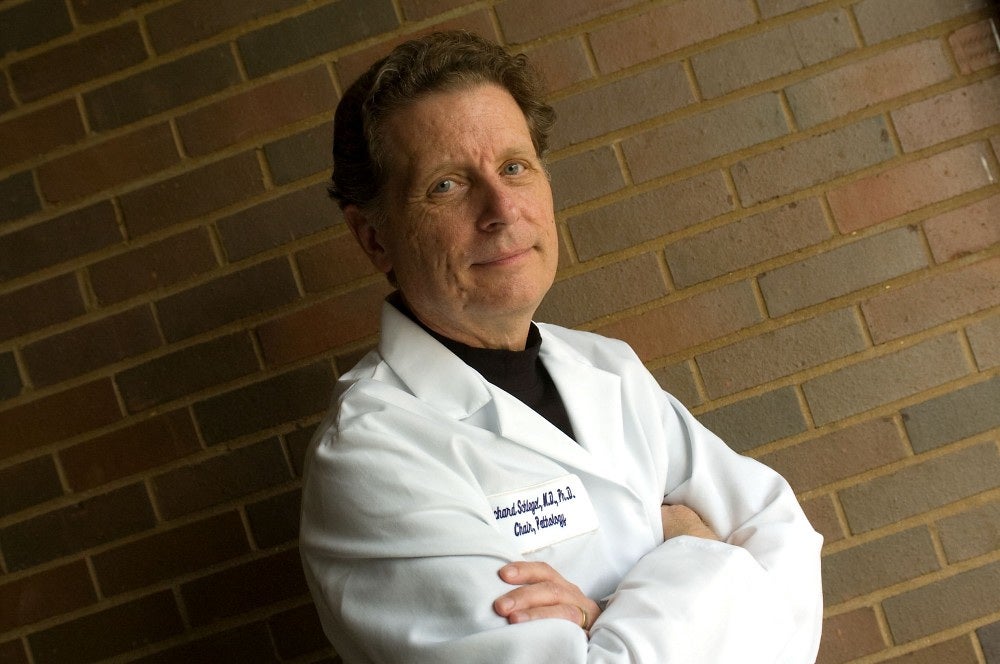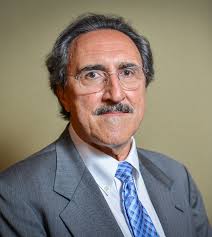Two Georgetown University Medical Center Researchers Named National Academy of Inventors Fellows
Posted in News Release | Tagged HPV, National Academy of Inventors, radiation therapy
WASHINGTON (Dec. 16, 2014) — Two Georgetown University Medical Center researchers have been named 2014 Fellows of the National Academy of Inventors (NAI): — Richard Schlegel, MD, PhD, Oscar B. Hunter Chair of Pathology, and Anatoly Dritschilo, MD, chair of radiation medicine.
The NAI says the highly selective fellow status is awarded to those “who have demonstrated a prolific spirit of innovation in creating or facilitating outstanding inventions that have made a tangible impact on quality of life, economic development, and the welfare of society.”

Schlegel is an expert in human papillomaviruses (HPV), which causes nearly all cervical cancers and contributes to several others. He co-developed technology for Gardasil, an HPV vaccine approved by the U.S. Food and Drug Administration in 2006. According to the American Cancer Society, HPV infections targeted by the vaccine have drop by 56 percent in the U.S. since the vaccine’s inception. Earlier this year, the President’s Cancer Panel said increasing HPV vaccinations is one of the “most profound opportunities in cancer prevention today.”
“It is a honor to receive this award for our HPV vaccine work and recognition for the positive impact that the vaccine will have on global health, for both women and men,” says Schlegel, a professor of pathology, oncology, microbiology and immunology, and obstetrics and gynecology and a member of Georgetown Lombardi Comprehensive Cancer Center.
Schlegel is also director of the Center for Cell Reprograming, which focuses on a new research technique that has multiple applications in science including cancer diagnostics and therapeutics. “We’re hopeful our work on conditional cell reprogramming will have a similar impact on medicine,” Schlegel adds.

Dritschilo chairs the department of radiation medicine at Georgetown. His clinical interest focuses on prostate cancer treatment, and his laboratory research centers on overcoming cancer cell resistance to radiation therapy. He was instrumental in creating the radiation biology research program at Georgetown, supported by over $30 million in funding over the past 30 years from the National Institutes of Health and industry.
Dritschilo is committed to a long-term strategy in research—a commitment that has allowed him to move research findings from concept to clinical translation. He holds a series of patents for radiation sensitizing drugs and methods of cancer treatment.
“I’m pleased to be recognized by the NAI as our work to translate better treatments for cancer patients continues,” says Dritschilo. “We are now working to develop and commercialization our radiation sensitizers for clinical use to improve the patients’ outcomes after therapy.”
According to the NAI, the academic inventors and innovators elected to the rank of NAI Fellow are named inventors on U.S. patents and were nominated by their peers for outstanding contributions to innovation in areas such as patents and licensing, innovative discovery and technology, significant impact on society, and support and enhancement of innovation.
The NAI Fellows will be inducted by the Deputy U.S. Commissioner for Patent Operations, from the United States Patent and Trademark Office, during the 4th Annual Conference of the National Academy of Inventors, next March in California.
Spiros S. Dimolitsas, Georgetown senior vice president for research and chief technology officer, and Ophir Frieder, professor and computer science chair, were appointed NAI Fellows in 2013 and Howard J. Federoff, MD, PhD, executive vice president for Health Sciences at Georgetown University Medical Center, was named a Fellow in 2012.
About Georgetown University Medical Center
Georgetown University Medical Center (GUMC) is an internationally recognized academic medical center with a three-part mission of research, teaching and patient care (through MedStar Health). GUMC’s mission is carried out with a strong emphasis on public service and a dedication to the Catholic, Jesuit principle of cura personalis — or “care of the whole person.” The Medical Center includes the School of Medicine and the School of Nursing & Health Studies, both nationally ranked; Georgetown Lombardi Comprehensive Cancer Center, designated as a comprehensive cancer center by the National Cancer Institute; and the Biomedical Graduate Research Organization, which accounts for the majority of externally funded research at GUMC including a Clinical and Translational Science Award from the National Institutes of Health.
